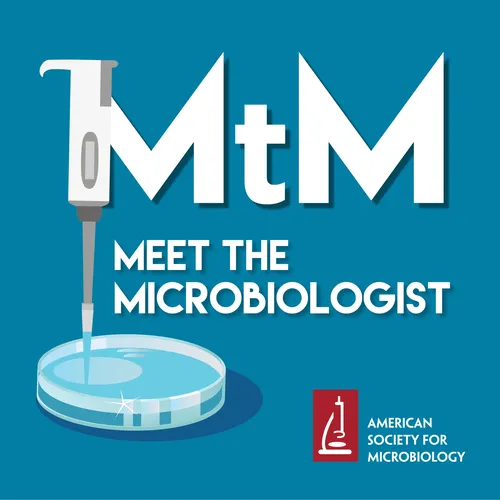
Meet the Microbiologist
Who is microbiology? Meet the Microbiologist (MTM) introduces you to the people who discover, innovate and advance the field of microbiology.
Go behind-the-scenes of the microbial sciences with experts in virology, bacteriology, mycology, parasitology and more! Share in their passion for microbes and hear about research successes and even a few setbacks in their field.
MTM covers everything from genomics, antibiotic resistance, synthetic biology, emerging infectious diseases, microbial ecology, public health, social equity, host-microbe biology, drug discovery, artificial intelligence, the microbiome and more!
From graduate students to working clinicians and emeritus professors, host, Ashley Hagen, Scientific and Digital Editor at the American Society for Microbiology, highlights professionals in all stages of their careers, gleaning wisdom, career advice and even a bit of mentorship along the way.
- Update frequency
- every 20 days
- Average duration
- 40 minutes
- Episodes
- 169
- Years Active
- 2008 - 2025

108: Microbes, Heme, and Impossible Burgers with Pat Brown
Pat Brown founded Impossible Foods with a mission to replace animals as a food production technology. Here, he discusses the ways microbial engineering helps produce the plant hemoglobin that provide…

107: CRISPR, anti-CRISPR, and anti-anti-CRISPR systems with Joe Bondy-Denomy
CRISPR is a genome-editing tool, but what is its role in microbial biology and evolution? Joe Bondy-Denomy discusses his discovery of the first anti-CRISPR protein and the many unanswered questions s…

106: Creepy dreadful wonderful parasites (and a few bacteria) with Bobbi Pritt
Julie’s Biggest Takeaways:
Parasites are incredibly varied in many characteristics, including their size! Some are microscopic, while others are macroscopic and can be seen with the naked eye. Not ju…

105: HPV vaccination with Doug Lowy
How did discoveries made with bovine papillomavirus help scientists develop the human papillomavirus vaccine? Doug Lowy discusses his journey that began with basic research and led to the production …

104: Burkholderia pseudomallei and the Neglected Tropical Disease Melioidosis with Direk Limmathurotsakul
Burkholderia pseudomallei is an endemic soil-dwelling bacterium in southeast Asia, where it causes melioidosis. Direk Limmathurotsakul discusses his work to improve the official reporting numbers and…

103: Predicting Spillover Events with Barbara Han
When will the next disease outbreak occur? Why are some pests better at spreading disease than others? Disease Ecologist Barbara Han talks about her research that addresses these questions with compu…

102: HIV vaccines with Dan Barouch
Why have scientists struggled to generate a protective HIV vaccine? Dan Barouch lays out the unique challenges and discusses the ongoing clinical trial with an adenovirus-based vaccine developed in h…

101: Structural Biology Insights into Ebola Virus with Erica Ollmann Saphire
Erica Ollmann Saphire discusses her research on Ebola virus glycoprotein and the changing nature of structural biology.
The Ebola virus glycoprotein sequence can vary up to 50% between Ebola virus sp…

100: It’s our 100th Episode! A retrospective into Meet the Microbiologist with Merry Buckley and Carl Zimmer
We pull back the curtain as former show hosts Merry Buckley and Carl Zimmer talk Meet the Scientist origins, favorite interviews and microbial topics.
Julie’s Biggest Takeaways:
Though the show start…

099: Microbial engineering for biofuels and beyond with Wayne Curtis
How does an engineer approach microbial genetics? cworks with microbes of all kinds to optimize metabolic and agricultural systems. Here he discusses his work with Rhodobacter to make biofuels and fo…

098: Insect and human microbial symbionts with Seth Bordenstein
Over the course of a few decades, scientists have learned how insect endosymbiont bacteria affects insect reproduction and have used this understanding to control mosquito-born diseases. Seth Bordens…

097: The Cool World of Glacial Microbiology with Christine Foreman
Christine Foreman explains how microbes can survive and grow on glaciers, and what we can learn from microbes in glacier ice cores.
Take the MTM listener (that's you!) survey asm.org/mtmpoll it only …

096: HIV interaction with the immune system with Mark Connors
A very small proportion of people infected with HIV do not develop AIDS. Mark Connors talks about 2 patient populations that his lab studies, the elite controllers and the elite neutralizers, who con…

095: The Evolution of Virulence with Andrew Read
In the early 2000s, Andrew Read predicted that non-sterilizing vaccines would lead to more virulent disease. He was able to test his hypothesis with the real-world example of Marek’s disease, a disea…

094: Containing a Nipah virus outbreak with G Arunkumar
A recent Nipah virus outbreak in Kerala, India, was halted due to improved detection capabilities. G. Arunkumar tells the story of his involvement.
Host: Julie Wolf
Take the MTM Listener Survey
Subs…

093: Biofilms and metagenomic diagnostics in clinical infections with Robin Patel
Robin Patel discusses her work on prosthetic joint infections and how metagenomics is changing infectious disease diagnostic procedures.
Take the listener survey: asm.org/mtmpoll
Julie’s Biggest Take…

092: A new type of malaria vaccine utilizing the mosquito immune system with Carolina Barillas-Mury
To eliminate malaria, you have to stop transmission, and that’s what Carolina Barillas-Mury hopes to do. Her work on the interaction of the malaria parasite Plasmodium falciparum may lead to a transm…

091: SARS and MERS coronaviruses with Stanley Perlman
How do researchers study a new pathogen? Stanley Perlman talks about how virus researchers studied SARS and MERS after they emerged, what they learned, and why there are no more cases of SARS. He als…

090: Using yeast to generate new chocolate and beer flavors with Kevin Verstrepen
You may know that beer is fermented, but did you know making chocolate requires a fermentation step? Kevin Verstrepen discusses how his lab optimizes flavor profiles of the yeast used in this ferment…

089: Using the zebrafish microbiome to study development and the gut-brain axis with John Rawls
How can the humble zebrafish teach us about the human microbiome? John Rawls discusses the benefits of using animal models
Take the MTM Listener Survey
Julie’s Biggest Takeaways:
Zebrafish and oth…